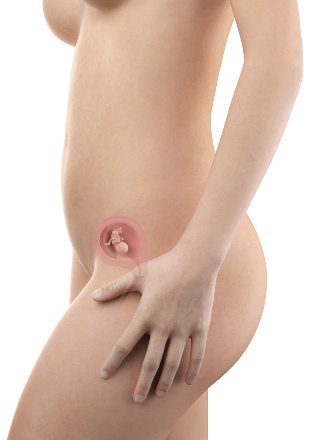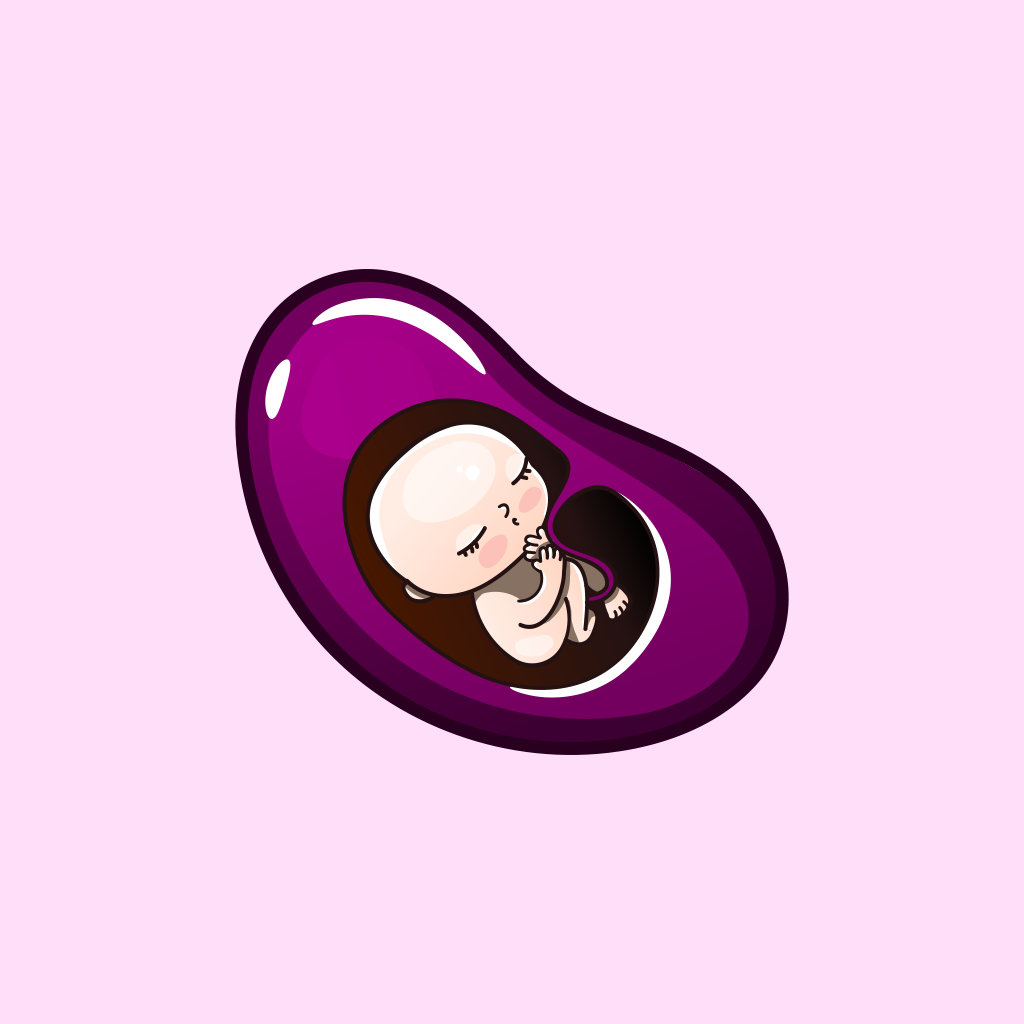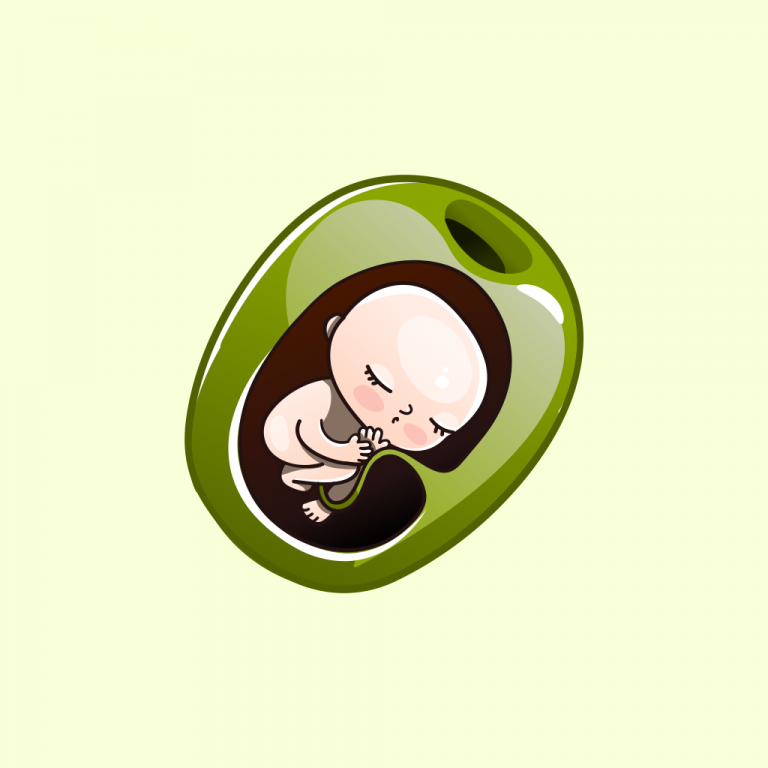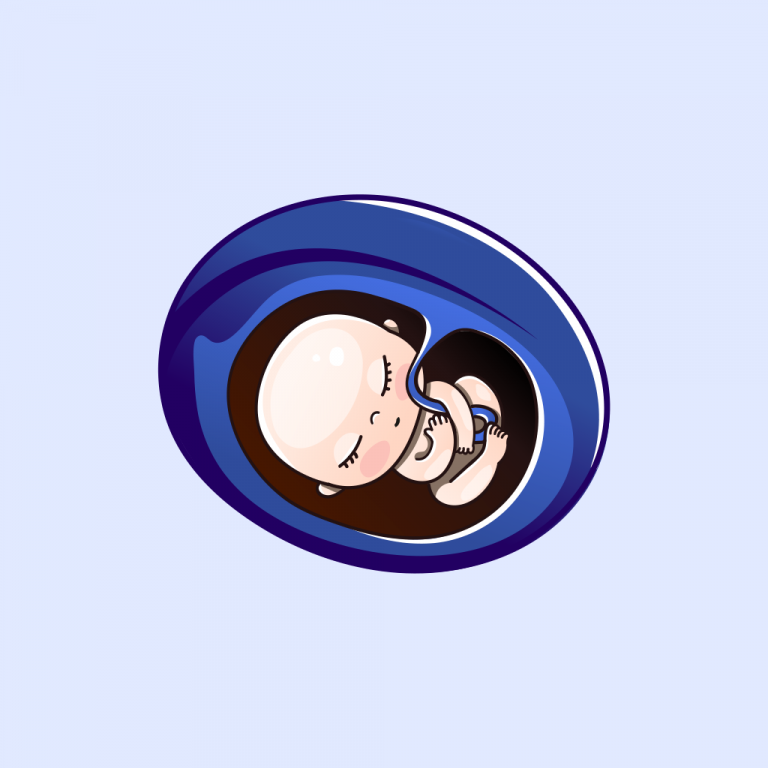Welcome to Week 8! You’re nearly two months into your pregnancy journey, and—whether you’re feeling a bit nervous or simply amazed—your body is working wonders every day. This week, your little one is about the size of a raspberry, and even though you can’t feel their movements yet, there is a whirlwind of development happening inside you.
At this stage, your baby is growing quickly. Their facial features are starting to take shape, tiny arms and legs are lengthening, and small fingers and toes are beginning to appear. The heart is beating more strongly now, and important organs like the brain and lungs are getting more complex. Even though your baby is still tiny, they are hitting major milestones every single day.

For many moms-to-be, Week 8 brings changes you might notice, such as extra tiredness, morning sickness, or mood swings. It’s completely normal to feel more emotional or to need more rest. Listen to your body—if you’re tired, take a break. Simple comfort foods, staying hydrated, and gentle activities, like short walks, can help you stay comfortable.
This week is also a good time to start thinking about your first prenatal visit, if you haven’t had one already. Your healthcare provider might do an ultrasound soon to check on your baby’s growth and well-being. They can help answer your questions, from safe foods to strategies for managing nausea or stress.
- Tip: Keep a small snack by your bedside. Eating something light, like crackers, before getting up may help with morning nausea.
- Try gentle stretches or light exercise to feel a bit more energized.
- Start jotting down any questions or concerns so you’re ready for your next check-up.
Remember, it’s perfectly normal to have worries and excitement mixed together right now. Take each day as it comes, lean on loved ones for support, and trust that you are doing an incredible job helping your little one grow.
Your Baby’s Development This Week
At week 8 of pregnancy, there’s something amazing happening—your tiny baby has officially graduated from being called an embryo to a fetus! Although your baby is still small (about the size of a raspberry), there are some big changes happening every day. Even though you can’t feel or see these changes just yet, knowing about them can help you feel more connected to your growing little one.
Right now, your baby is measuring just over half an inch long. It’s incredible to imagine, but even at this early stage, your baby’s unique features are taking shape. Little hands and feet are forming, with tiny fingers and toes beginning to separate—though you might still notice some webbing between them in early images. Your baby’s arms can now bend at the elbows and wrists, allowing the first tiny, unnoticeable stretches and wiggles to begin.
- Developing Features: Facial features continue to form this week. Your baby’s upper lip and nose are coming together, and small bulges mark the spots where ears will eventually appear. The eyes are looking more defined too, with dark pigmentation showing up where the irises will be.
- Growing Limbs: While tiny paddle-shaped legs might not look quite like baby legs yet, they’re growing longer each day. Knees, thighs, and ankles are beginning to emerge as your baby develops a more familiar human shape.
- Busy on the Inside: Inside that rapidly growing body, your baby’s intestines are getting longer. For now, they may temporarily extend into the umbilical cord—a totally normal part of development that will resolve as your pregnancy progresses.
- Genital Buds: Even though it’s too early to find out if you’re having a boy or girl by ultrasound, the tiny genital “buds” are present and will start developing into male or female organs in the coming weeks.
- Tiny Movements Begin: Your baby is starting to move—wriggling, stretching, and maybe even doing a little curling dance! These movements are spontaneous and can’t be felt by you just yet, but they’re a positive sign that nerves and muscles are getting to work.
While these changes are happening, your baby is also developing other important body parts. The beginnings of the outer ears are visible, and the eyes are moving from the sides of the head toward their final position. Skin is paper-thin, and tiny bones are starting to take shape underneath.
Because these early weeks are full of rapid growth, your baby is relying on all the nutrients you provide. Make sure to keep up with prenatal vitamins, especially those containing folic acid, as they support your baby’s brain and spinal cord. Staying well-hydrated and choosing fresh, nourishing foods will give your baby the healthiest possible start.
Don’t worry if everything still feels very new and maybe even a little overwhelming. Every day, your little one is working hard to grow, and you’re doing a wonderful job nurturing them already—even when you can’t see or feel it yet.
Changes in the Mother’s Body
At week 8 of pregnancy, your body is making incredible adjustments as it nurtures your growing baby. Even though you might not be showing just yet, a lot is happening behind the scenes. It’s normal to feel a mix of excitement, tiredness, and curiosity about what each new day brings. Let’s talk about some of the changes you may experience right now—and remember, every pregnancy is unique, so your journey may differ from someone else’s.
By this stage, your uterus is already expanding to create a cozy space for your little one. It’s now about the size of a small lemon or grapefruit, which is much bigger than before you were pregnant. Even if you can’t see this change from the outside, you might notice a feeling of bloating or fullness in your lower tummy. Some moms-to-be even find that their clothes fit a bit snugger around the waistline.
Hormones are working overtime in your body to support your developing baby. These hormonal shifts can cause you to feel more tired than ever, perhaps needing more rest than usual. If you find yourself wanting to nap or head to bed early, that’s completely normal—your body is working hard!
Another common symptom at this stage is morning sickness. The name is a little misleading, as queasiness or even vomiting can happen at any time of the day or night. You may notice that certain smells or foods you once loved now seem unpleasant. Eating smaller meals throughout the day and keeping snacks like crackers nearby can sometimes help ease nausea. If you have trouble keeping anything down, let your healthcare provider know.
Your breasts may also change noticeably—they might feel sore, sensitive, or swollen. This is your body’s way of getting ready to feed your baby later on. Some women find their bras feel tight, and wearing a soft, supportive bra can bring comfort. You might even spot blue veins beneath the skin as blood flow increases to this area.
Increased trips to the bathroom are another typical change. As your uterus grows, it pushes a bit on your bladder, making you feel the urge to urinate more often. Try to stay hydrated, but if you experience pain or a burning feeling when you pee, it’s important to contact your doctor.
It’s also common to experience emotional ups and downs at this time. Fluctuating hormone levels combined with excitement—and maybe a little anxiety—can leave you feeling moody or teary. These emotional shifts are all part of the journey, so be gentle with yourself and let loved ones know how you’re feeling.
- Light cramping: Some women notice mild cramps or pulling sensations in their lower belly as the uterus stretches. Gentle discomfort can be normal, but if cramps are severe or come with bleeding, call your doctor right away.
- Changes in vaginal discharge: You might spot more clear or milky discharge, which is the body’s way of keeping the birth canal healthy. If the discharge has a strong odor, is yellow or green, or you feel itching, let your healthcare provider know just to be safe.
- Sensitivity to smells: Even everyday scents may suddenly seem overwhelming. If you find certain odors unpleasant, try to avoid those triggers when possible.
Every woman’s experience will differ, and all these changes mean your body is doing the important work of growing a new life. Take time to rest when you need it, eat small healthy meals, and try to stay connected with your healthcare team. Don’t hesitate to ask questions—your well-being matters, too!
Your Week 8 Prenatal Checkup: What to Expect
Reaching 8 weeks pregnant is an exciting milestone! Around this time, it’s important to see your healthcare provider for your first official prenatal checkup if you haven’t already. Early checkups help make sure you and your baby are both on track for a healthy pregnancy. Here’s what you can expect, and how these checkups help you and your growing little one.
- Pregnancy Confirmation:Your doctor or midwife will usually confirm your pregnancy with a urine or blood test, even if you’ve already taken a home test. This is just to be certain and to officially mark the start of your prenatal care.
- Learning About Your Health: You’ll be asked about your health history, any medicines you take, allergies, and your family’s medical background. This helps your provider give you the very best care for your unique situation.
- Physical Exam: Plan for a head-to-toe check, including a gentle exam of your abdomen and a look at your vital signs like weight, blood pressure, and heart rate. Sometimes, a Pap test and routine blood work are done to screen for infections and check things like iron levels.
- First Look at Your Baby: If your provider has an early ultrasound machine, or if there’s any question about your due date, a quick scan might be done around now. This allows your care team to check how far along you are and see how your baby is developing.
- Routine Screenings: Your blood sample will likely be tested for blood type, Rh factor, anemia, and immunity to certain infections. Screening for sexually transmitted infections is also common—these tests help catch and treat anything that could affect your pregnancy early on.
- Talking About Pregnancy Life: Your provider will want to know how you’re feeling—physically and emotionally. This is a great time to talk about any symptoms, worries, or questions, like nausea, food cravings, mood changes, or any bleeding or cramping.
- Advice on Staying Healthy: Expect tips on foods to eat (and avoid), safe activity, hydration, vitamins, and which medications are okay to take. Your doctor will talk about keeping active, why prenatal vitamins matter, and how to keep your pregnancy as healthy as possible.
- What’s Next: You’ll get a plan for upcoming visits, what tests to expect (such as genetic screening, offered in the first trimester for some families), and an idea of important symptoms to watch for between now and your next checkup.
This first big checkup sets the foundation for the rest of your pregnancy. Remember, every question you have is important—no topic is too small or silly. Your medical team is here to support you every step of the way, making sure both you and your baby get the best possible start.
Nutritional Tips and Physical Exercise
At week 8, your body is working hard behind the scenes to support your growing baby. Thoughtful nutrition and gentle movement can make a big difference in how you feel—and help set the stage for a healthy pregnancy. Here’s how to take good care of yourself this week.
- Give Your Meals a Color Boost: Try to fill your plate with vegetables and fruits in a range of colors. Bright orange carrots, deep green spinach, red peppers, and dark berries all offer different nutrients that help your baby develop and keep your energy up.
- Pick Iron-Rich Foods: Your blood volume is increasing, so you’ll need more iron. Beans, lentils, lean meats, eggs, and iron-fortified cereals are excellent options. Pairing them with vitamin C-rich foods (like a squeeze of lemon or some strawberries) helps your body absorb iron better.
- Handle Queasiness with Snack Smarts: If nausea is bothering you, eat small amounts often. Crackers, applesauce, or a slice of toast can be gentle on your stomach. Keeping something light at your bedside can make mornings easier.
- Focus on Healthy Fats: Some fat is good for your baby’s brain and eye development. Avocado, nuts, seeds, or a spoonful of peanut butter are great ways to work healthy fats into your day.
- Don’t Forget Hydration: Try carrying a water bottle and sipping throughout the day. If plain water is unappealing, add a slice of lemon, cucumber, or a splash of fruit juice for flavor.
- Keep Dairy (or Alternatives) On Hand: Calcium matters for strong bones and teeth. If you don’t do dairy, plant-based choices like fortified soy, almond, or oat milk can help you meet your needs.
Now, about exercise: gentle movement is safe for most women and brings lots of benefits in early pregnancy, such as boosting your mood, improving sleep, and easing stress. Always discuss any new activity with your healthcare provider, especially if you have health concerns.
- Walking: Walking is easy to fit in, doesn’t require equipment, and gives you fresh air. Even short strolls a few times a week are helpful.
- Prenatal Stretching and Yoga: Prenatal yoga classes or simple stretches at home can help with flexibility and relaxation. Look for beginner routines that avoid lying flat on your back or deep twists.
- Low-Impact Movement: Swimming or water aerobics are gentle on your joints and can help with swelling or soreness. Many pools offer classes for expecting moms, but light water walking or floating is beneficial, too.
- Listen to Your Body: It’s normal to be tired and need extra rest now. Move when you feel up for it, rest when you need to, and try not to compare yourself to anyone else.
Remember, you don’t need a perfect diet or a strict exercise plan. Small, positive choices add up. They are a gift to yourself and your baby, helping each of you grow stronger together.
Weekly Checklist
Congratulations on reaching week 8! Your baby is growing quickly, and your body is working hard to support this new life. Here are your important to-dos for this week to help you take the best care of both yourself and your little one:
- Schedule or attend your first prenatal appointment: If you haven’t already, set up that first doctor’s visit. This is your chance to ask questions, confirm your pregnancy, and discuss what to expect in the coming months.
- Track how you’re feeling: Keep a simple journal of your symptoms or any changes you notice, like morning sickness, fatigue, or cramping. Bring these notes to your doctor’s appointment—they’ll help your provider give you the best care possible.
- Stick with your prenatal vitamins: Remember to continue taking your daily prenatal vitamin with folic acid. If you’re having trouble swallowing pills or keeping them down, let your doctor know—there may be alternatives or tips that can help.
- Review your eating habits: Try to include one extra serving of leafy greens or colorful fruits this week, if possible. These foods are rich in nutrients tiny babies need right now.
- Watch what you drink: Choose water most often and limit caffeine. If coffee or tea is part of your routine, use a measuring cup to check your serving size so you stay within recommended limits.
- Rest when you can: Fatigue often peaks now, so give yourself permission to nap or go to bed a little earlier. Your body is doing important work!
- Stay ahead of nausea: Eat small snacks throughout the day, like crackers, fruit, or nuts, to help with queasiness. Keep a snack in your bag for when you’re out and about.
- Be mindful of gentle exercise: Fresh air and light walks can boost your mood and energy. If you exercised before pregnancy, you can usually keep going, but listen to your body and avoid anything that feels uncomfortable.
- Notice any unusual symptoms: Light spotting is common, but if you have heavier bleeding or strong cramps, reach out to your healthcare provider right away.
- Reach out for support: Whether it’s your partner, a family member, or a friend, don’t hesitate to share how you’re feeling and ask for help if you need it. Emotional support is just as important as physical health.
This week is a big milestone, so remember that you’re doing a great job. Take care of yourself, and don’t be afraid to ask questions or lean on others as you move through these early weeks of pregnancy.
When to Call Your Doctor
While many body changes and mild discomforts are normal in early pregnancy, some symptoms need extra attention. It’s always better to check in if something doesn’t feel right, even if you’re not sure it’s a big deal. Your peace of mind matters, and your doctor is there to help you every step of the way. Here are some signs to watch for at week 8 that mean it’s a good idea to reach out to your healthcare provider:
- Vaginal bleeding heavier than spotting: Light spotting can happen, but if you notice bright red blood, passing clots, or your bleeding soaks a pad, please call your doctor right away.
- Strong or persistent abdominal pain: Mild cramping is common, but sharp, severe, or persistent pain (especially if it’s one-sided or paired with shoulder pain) deserves prompt attention.
- Severe back pain: Backaches are common, but intense or worsening pain could signal something that needs checking.
- Sudden gush or steady trickle of fluid from your vagina: If you feel wetness that isn’t urine, let your provider know to rule out any concerns.
- Fever over 100.4°F (38°C): A mild rise in temperature is normal, but a high fever — especially with chills or body aches — can be a sign of infection.
- Severe or persistent vomiting: Nausea is common, but if you’re unable to keep down any fluids or food for more than 12 hours, this can lead to dehydration and needs attention.
- Severe headaches, vision changes, or dizziness: Occasional headaches happen, but if they’re nonstop or accompanied by seeing spots, blurred vision, or fainting, call your doctor.
- Painful or burning urination: This could be a sign of a urinary tract infection, which is treatable but should be caught early.
- Shortness of breath or chest pain: If you ever have trouble catching your breath when resting, or you feel chest tightness or pain, get medical care as soon as possible.
- Unusual swelling in your hands, face, or around your eyes: Mild swelling is normal later in pregnancy, but sudden or severe swelling this early can be a red flag.
- Loss of pregnancy symptoms: If you suddenly stop feeling any symptoms (like breast tenderness or nausea) and feel worried, trust your instincts and check in with your provider.
Remember, every pregnancy is a little different. If you have a gut feeling that something isn’t quite right, reaching out to your healthcare team is always the right choice. They want to support and reassure you as much as possible during this special time.
Preparations for Baby
This week, you may not see many changes around your home yet, but gently preparing for baby can help you feel more in control and connected to your pregnancy. Even small steps now can make things easier later on. Here are some warm and practical tips for your week 8 journey:
- Start a baby folder or journal: Keep a notebook or a folder (digital or paper) where you can jot down doctor’s advice, note how you feel, and track questions you might want to ask at your next visit. This little bit of record-keeping will help you feel more organized and prepared as your pregnancy moves forward.
- Begin thinking about your support team: Take a moment to consider who you might want nearby as pregnancy progresses and once baby arrives—your partner, family, or friends who help you feel supported and cared for. It’s not too early to share your news with those closest to you if you feel ready.
- Choose a calm corner: Look around your home for a cozy spot to read, nap, or just breathe when you need a quiet break. Pregnancy can be tiring, so having your own “comfort corner” can make a difference for daily self-care.
- Explore childcare options: If you’ll eventually need childcare, starting casual research now can reduce pressure later. Ask trusted friends or coworkers about their experiences, or look up local services online to get a sense of what’s available.
- Celebrate small moments: Mark each pregnancy milestone, no matter how tiny. Maybe light a candle for yourself after a long day or treat yourself to your favorite (pregnancy-safe) snack. These moments will lift your mood and remind you of your progress.
- Talk with your partner: Week 8 is a great time to share how you’re feeling and invite your partner into the experience, whether that’s discussing hopes for the baby or letting them know about symptoms you’re experiencing. These little talks will help you both feel connected through the journey.
- Learn something new about pregnancy: Each week, set aside time to read a new tip or watch a short video about what’s happening inside your body. Understanding what’s ahead can replace worries with calm and confidence.
Remember, preparing for your baby isn’t just about decorating the nursery or buying supplies. It’s also about building a foundation of emotional support, small routines, and joyful moments that nourish you both along the way.
Citations and References
- American College of Obstetricians and Gynecologists (ACOG) – Details prenatal care, fetal development, and recommended screenings for early pregnancy. Visit Source
- Mayo Clinic – Offers an overview of week-by-week fetal development, typical maternal symptoms, and prenatal recommendations. Visit Source
- National Health Service (NHS, UK) – Provides guidance on pregnancy symptoms, nutrition, and fetal milestones by week. Visit Source
- Centers for Disease Control and Prevention (CDC) – Recommends on prenatal nutrition, use of folic acid, and substances to avoid during pregnancy. Visit Source
- Cleveland Clinic – Explains typical changes to expect, fetal developments, and key symptoms during the first trimester. Visit Source
- Nemours KidsHealth – Breaks down week 8 fetal growth and outlines which symptoms are expected or cause for concern. Visit Source
- National Institutes of Health (NIH) MedlinePlus – Shares recommendations for prenatal supplements, healthy nutrition, and routine early-pregnancy care. Visit Source
- World Health Organization (WHO) – Provides general standards on essential antenatal care, nutritional needs, and substances to avoid in pregnancy. Visit Source










